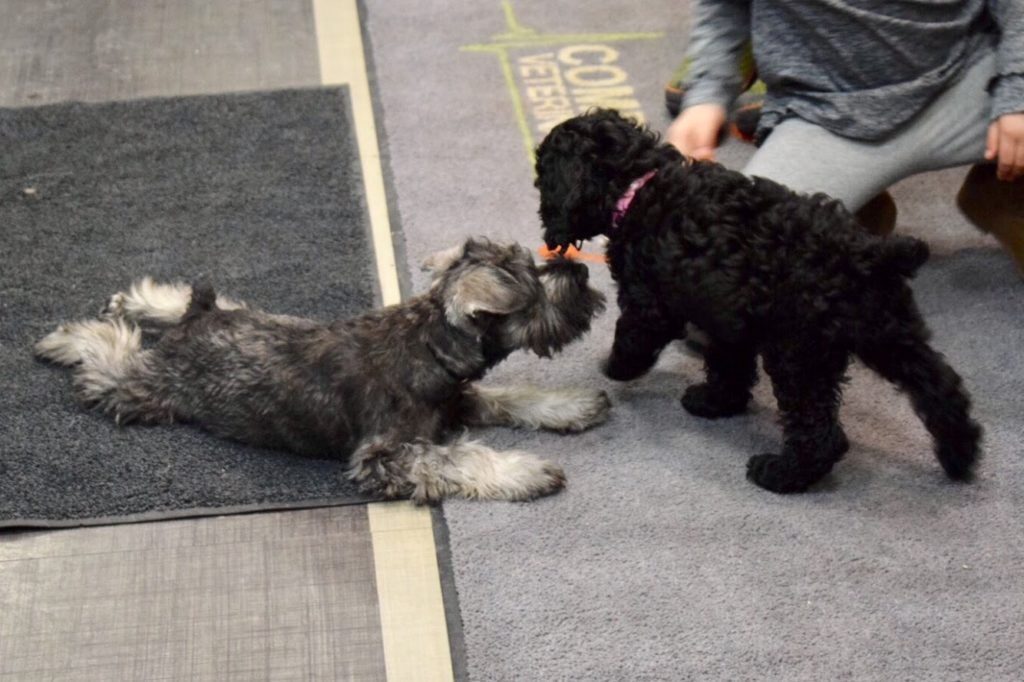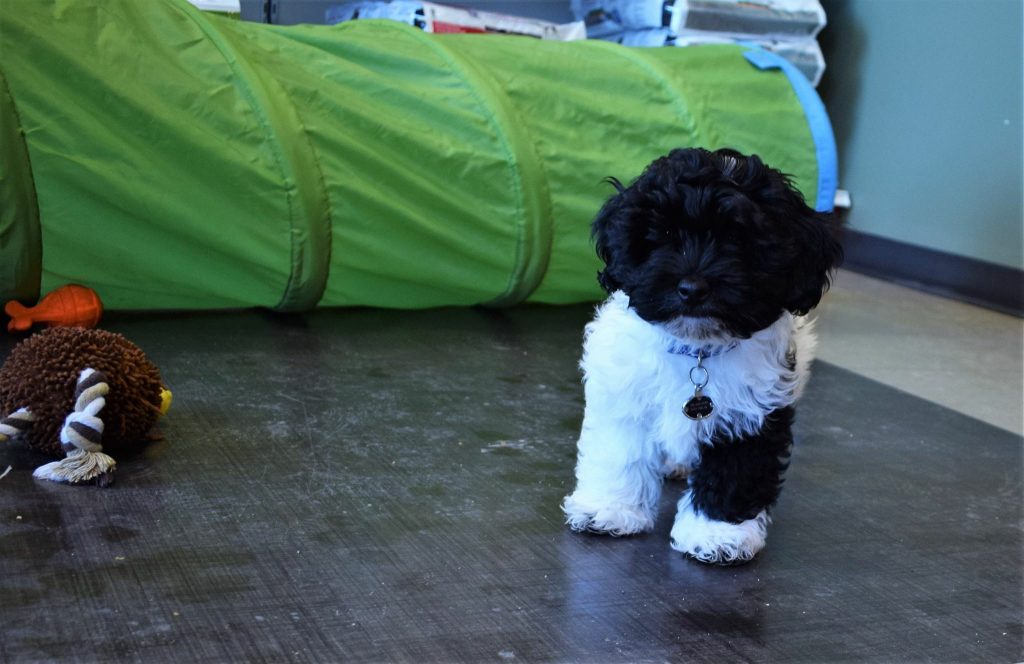Starting Your Puppy Off on the Right Paw
Puppy Socialization
Why do you hear from some professionals that you need to wait until your puppy is fully vaccinated and from others that you need to get your puppy out into the world as soon as possible?
There is a misconception in parts of the veterinary and training world that it’s safer to keep puppies away from other puppies and even outdoors until they are fully vaccinated. This way of thinking stems from the potential for them to contract diseases. This is not true. I am not saying it is impossible for a puppy to contract diseases from other puppies, but this risk is substantially lower than the risk of damaging a puppy’s development if they are not exposed to people, other dogs and novel stimuli.

The position statement from the American Veterinary Society of Animal Behavior states, “…the American Veterinary Society of Animal Behavior believes that it should be the standard of care for puppies to receive such socialization before they are fully vaccinated. Because the first three months are the period when sociability outweighs fear, this is the primary window of opportunity for puppies to adapt to new people, animals, and experiences. Incomplete or improper socialization during this important time can increase the risk of behavioral problems later in life including fear, avoidance, and/or aggression.” (AVSAB, 2008).
The sensitive period of a puppy occurs between the ages of 3-12 weeks of age. This is the most important period of your dog’s life. They need to be exposed to the world. Albeit, slowly, controlled and positive, but it can not wait.
What is the safest way to ensure your puppy has appropriate exposure to the world? Join a low volume puppy class. Controlled classes are structured, puppies and people are relatively calm throughout the class, puppy playtime is short and successful. Separate learning areas are crucial, as it is difficult for puppies to focus with the distraction of people and other puppies. Orientation prior to class is helpful to allow owners to understand expectations set out for themselves and their puppies.
In addition to puppy class, you can do the following to help set your puppy up for success:
- Setting up play dates with vaccinated, socially normal puppies and calm adult dogs.
- Train your puppy using reward-based training to help develop a strong bond with your puppy.
- Take your puppy for short successful walks. These walks should be training walks as every opportunity is a chance for your puppy to learn. Manners on-leash, if not taught at a young age can develop into frustration and even reactivity over time.
- Visit calm controlled environments, a friend’s house for example, with small children who are well behaved. This exposes your puppy to children in a controlled manner rather than taking them to a playground and having multiple little hands trying to interact with them all at once.
For more information on building confidence, Pandemic Puppies: How To Build Confidence One Paw at a Time, is a free two-part webinar that will go over puppy development, body language, how to set your puppy up for success during Covid-19, what we can do if your puppy is displaying signs of fear and much more!

One of the biggest concerns with this developmental period is the difference between flooding and exposure. Puppy classes should always involve controlled, positive exposure as this keeps your puppy from exhibiting signs of stress and allows them to learn successfully. However, flooding involves prolonged exposure to the worrisome stimulus at a level that provokes the response (Overall, 2013). A good example of this occurs when well-meaning owners take their puppies to the dog park to socialize them with other dogs. Often this is overwhelming for a puppy to be exposed to multiple dogs in one area that may not all be socially normal. It’s also unlikely your puppy has a reliable recall at this point and there is always a risk of disease when many dogs are in an area with unknown health status. The same stressful responses can occur in any high-volume areas, such as visits to the pet store and attending daycares that do not have a separate low volume puppy area and frequent breaks from play throughout the day.
To be successful during this period of development, be an advocate for your puppy. We are not perfect and not every interaction they have is going to be stress-free but learning to recognize their signs of stress and being able to remove them from the situation is paramount. If you are unsure if your puppy is experiencing stress or may need more help than he/she can receive from a puppy class it is always in your puppy’s best interest to contact a science-based, positive dog training or behaviour professional.
Companion Veterinary Clinic offers multiple puppy and adult classes for all stages of development.
By: Jessica Benoit RVT, VTS (Behaviour), KPA CTP, CPDT-KA, Fear Free certified
Additional articles regarding Puppy Socialization:
An Investigation into the Impact of Pre-Adolescent Training on Canine Behavior
Frequency of CPV infection in vaccinated puppies that attended puppy socialization classes
Cited References:
The American Veterinary Society of Animal Behavior: https://avsab.org/wp-content/uploads/2019/01/Puppy-Socialization-Position-Statement-FINAL.pdf
Accessed June 2021
“Manual of Clinical Behavioral Medicine for Dogs and Cats.” Manual of Clinical Behavioral Medicine for Dogs and Cats, by Karen L. Overall, Elsevier, 2013, p. 74.
